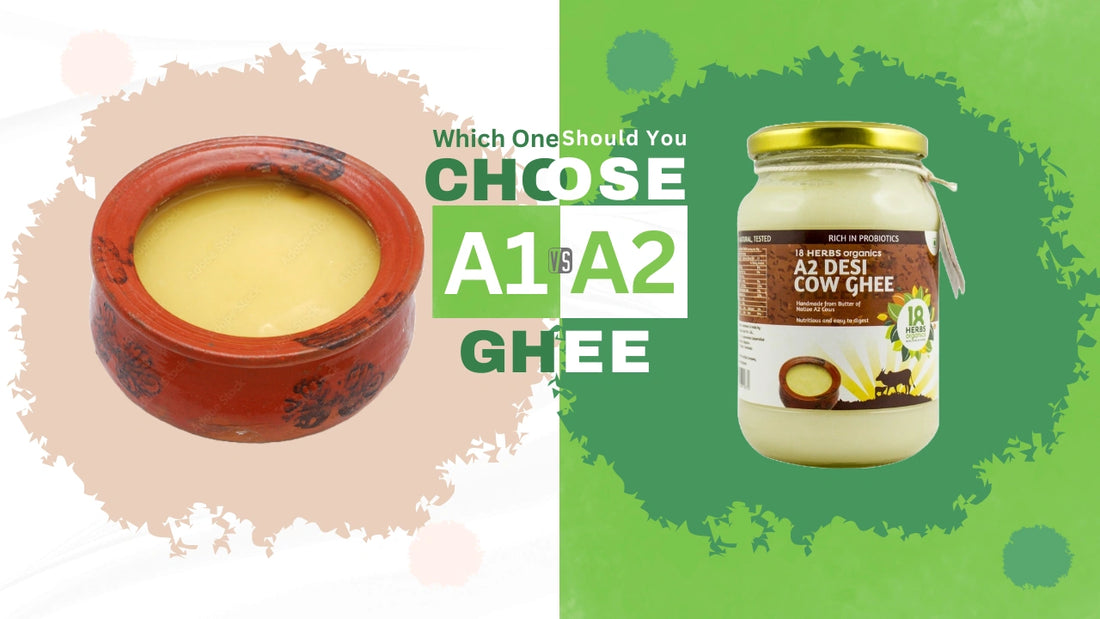Ghee, a form of clarified butter, has been revered for its culinary and medicinal properties in Indian culture. It is known for its rich flavour, high smoke point, and various health benefits. With a surge in popularity, multiple ghee brands flood the market, leaving consumers bewildered about the best option for their health. Among the top contenders are A1 ghee and A2 ghee, but what sets them apart and which one should you opt for? Let's explore the details of A2 ghee and why it might be the healthier choice.
The Process of Making Desi A2 Cow Ghee
A1 Ghee Production:
- A1 ghee is typically sourced from conventional dairy cows like Holsteins and Friesians.
- These cows predominantly produce the A1 beta-casein protein in their milk.
- The A1 beta-casein protein can be harder to digest for some individuals, leading to potential health issues.
A2 Ghee Production:
- A2 ghee is exclusively sourced from Desi cows like Gir, Sahiwal, and Red Sindhi breeds.
- Desi cows predominantly produce the A2 beta-casein protein in their milk.
- The A2 beta-casein protein is believed to be easier on digestion and less likely to cause intolerance.
Differences Between A1 Ghee and A2 Ghee
A2 Ghee |
A1 Ghee |
| It contains A2 protein found in purebred cows. | It contains A1 protein found in hybrid cows. |
| Cows naturally produce 10 - 15 litres of milk every day. | Cows are mutated to produce 30- 35 litres of milk every day. |
| It has colostrum that makes it akin to human mother’s milk. | It is low in nutrition. |
| Is easy to digest. | Hard to digest. |
| Has strontium and cerebrosides that enhance immunity and brain power. | Can cause bloating, acidity, and ulcers in the stomach. |
| Cows are fed organic and nutrient-rich feed. | Cows are given GMOs, antibiotics, and growth hormone injections to increase yield. |
| Cows that give A2 milk have humps that store vitamin D. | Cows that give A1 milk are without humps. |
Nutritional Value:
- A2 ghee is thought to have a higher nutritional value due to the presence of A2 beta-casein protein.
- A1 ghee may lead to digestive discomfort in some individuals due to the A1 beta-casein protein content.
Digestibility:
- A2 ghee is often considered easier to digest and may be a better option for those with lactose intolerance or dairy sensitivities.
- A1 ghee may cause digestive issues for some individuals, leading to bloating, gas, or other discomfort.
Health Benefits:
- A2 ghee is believed to offer various health benefits, including improved digestion, better nutrient absorption, and potential anti-inflammatory properties.
- A1 ghee may not be as well-tolerated by certain individuals and could contribute to inflammation and other health concerns.

Compelling Reasons to Choose A2 Ghee
Health Considerations:
Choosing A2 ghee may support better digestion and overall well-being by opting for a protein that is easier on the stomach.
Nutritional Profile:
The higher nutritional content of A2 ghee might provide more health benefits compared to A1 ghee, making it a preferable option for those seeking optimal nutrition.
Personal Experience:
After switching to A2 ghee, I noticed a significant improvement in my digestion and overall health, solidifying my belief in its potential benefits.
Conclusion
When considering the healthier choice between A1 ghee and A2 ghee, the latter emerges as a promising option for those looking to prioritize their well-being. With its potential digestive benefits, superior nutritional profile, and positive personal experiences, A2 ghee stands out as a compelling option in the realm of ghee varieties. Make an informed decision for your health by choosing A2 ghee as a cornerstone of your dietary choices.

